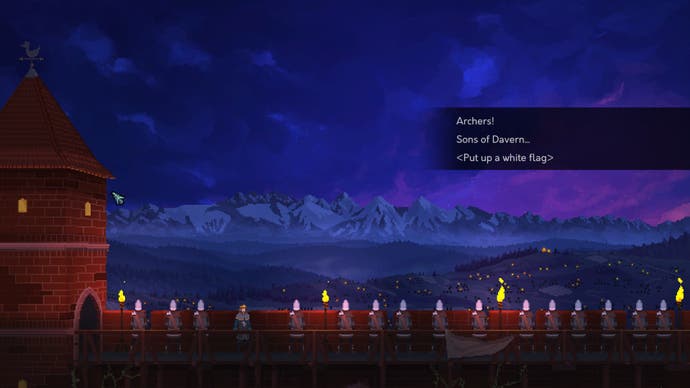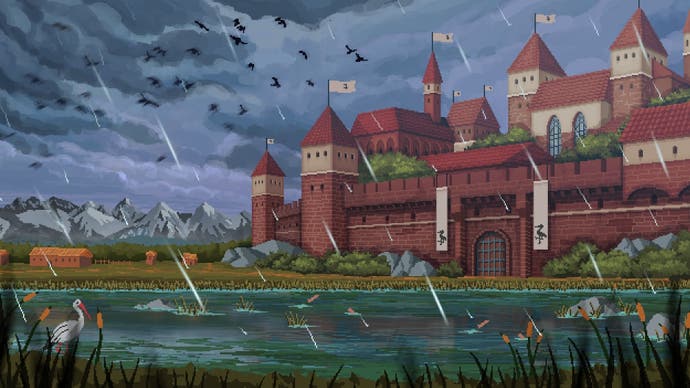Yes, Your Grace review - punishing, overly bleak kingdom management
Measuring a ruler.
After a long development journey since its arrival on Kickstarter in 2015, Yes, Your Grace is finally here, smaller than previously proposed, but with its original idea intact - almost a metaphor for my own in-game kingdom after I've tried my best to be a good and just king.
You play as Eryk, King of Davern, who each week welcomes petitioners to his halls to listen to their problems and hopefully find a satisfactory resolution. A line of petitioners forms in your throne room, which can include pleas from poor peasants, offers from merchants or requests from your three daughters and your wife. While your family needs you to mediate or put your foot down as head of the household, whether it's soothing your wife's worries at the state of things or your teenage girls bickering amongst each other, other petitioners have more practical needs: gold or supplies. A quick glance at your resources, permanently visible at the bottom of the screen, tells you what you have available. Spoiler alert: it's not much. It never is, and that's the whole point. For every request you grant there will be dozens you'll have to decline, managing a tight balancing act between keeping your people moderately happy and your coffers and supply stores filled.
Yes, Your Grace has three distinct phases following plot developments. The first hour is like a tutorial - here you only dole out resources or send out your general with the highly medieval name Stan to solve arguments or protect villages from bandits. Everyone is still moderately happy. But soon war is brewing as the Radovians, barbarians from beyond the mountains, come to collect on the princess you promised them 13 years ago. There's nothing for it but to quickly marry her off to someone else to gain an army, then start preparing for war. I don't want to spoil everything but it's safe to say that things only get progressively worse from there on out, not only because you now have more demands than ever to juggle. Besides your general you can use a witch and a hunter as your agents. They sort magic- or animal-related mishaps or scout the kingdom for supplies. Alliances with lords need to be forged, and your castle needs to be fortified. Agents are paid in advance, soldiers need to be fed, and then there's that pesky bank loan I took up that's now steadily draining away my funds...
At times, decision-making in Yes, Your Grace feels like standing at a conveyor belt. Perhaps purposefully so, seeing as YYG's creator Rafał Bryks was strongly inspired by Lucas Pope's Papers, Please. And yet, as I compare Yes, Your Grace with all the other tough decision-making sims out there, from Frostpunk to The Banner Saga to Not Tonight, it falls flat in one important aspect - humanity. Beyond a happiness stat I need to maintain to avoid a game over, there's nothing for me in this row of lemmings that makes me feel for them. Sometimes this is due to situations turning out unintentionally humorous. Instead of voiceover in a language, in YGG characters begin each sentence with a made-up language. This can work, the way it did in Supergiant's Pyre, but this is too lilting, too close to Simlish - King Eryk wailing a plaintive "Doy" before swaying and falling from his throne in a fainting spell or the happiness metre going down to the sound effect of a sitcom studio audience aww-ing are unintentionally funny and break immersion.
That's especially jarring as Yes, Your Grace is anything but funny most of the time, both narratively and mechanically. There's a fine line between a game being challenging and covering difficult themes and it just being frustrating to play. This isn't to rehash the "do games have to be fun?" debate of yesteryear, but even the bleakest games make concessions for their players, whether they allow room for mistakes or throw you a lifeline. Nothing of the sort happens in Yes, Your Grace, and to me that's a case of realism being taken too far.

Losing is an abrupt affair, usually down to a single misstep. The game does save at the end of each week, but unless the mistake that led to you losing took place in your previous turn, you have to replay quite a chunk of content with no skip button. Some problems also seem down to pacing errors - by the third phase of the game, I had no tax income and a new source of income I had devised in the second or third week started paying exactly one round before the last battle.
I enjoyed the parts of Yes, Your Grace that took part away from the main gameplay loop around resource distribution. Eryk's family is a charming lot, with all the bickering and occasional teenage rebellion that make for a believable family dynamic. The writing is solid all around, from the large variety in requests to the main story surrounding the wars I watched everything unfold with interest. You wage two battles, and in both you give orders to your soldiers and may get some extra help here and there depending on the decisions you made before. The battles were not only exciting, but also a great break from taking care of petitioners. The pixel art is really pretty and detailed, especially the scenes set at night are lovely to look at and you can even tell each peasant clearly apart by their clothes and hairstyles.
Yes, Your Grace isn't unbeatably difficult by any means, but it comes down to single, completely unredeemable choices so often that doing well without the benefit of hindsight is never the result of careful planning so much as sheer dumb luck. At the end I may have won the war but it came at great cost, resulting in an ending so devoid of hope my efforts feel largely wasted.











